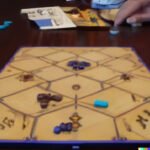Looking for classic board games for ages 4-6? Look no further. Board games have been a staple in family fun and childhood development for generations.
From teaching valuable social skills to boosting cognitive abilities, these games offer a plethora of benefits for young children. In this article, we will explore the world of classic board games specifically tailored to the age group of 4-6. Whether you’re a parent, teacher, or caregiver, this guide will provide you with invaluable insights into the importance and selection of board games for young children.
Board games have long been recognized as a wonderful tool for learning and growth in early childhood development. Not only do they provide endless hours of entertainment, but they also help children develop essential skills such as critical thinking, decision-making, and problem-solving. Additionally, these games encourage social interaction and cooperation among peers, making them an invaluable resource for fostering positive relationships and communication skills at an early age.
In the following sections, we’ll delve further into the benefits of board games for young children, explore the top 5 classic board games recommended for ages 4-6, discuss strategies for choosing the right game based on your child’s age and skill level, share tips for teaching young children how to play these games effectively, and examine the educational value of these classics.
So get ready to embark on a journey through the world of classic board games as we uncover their significance in childhood development and family bonding.
Benefits of Board Games for Young Children
Board games offer numerous benefits for young children, making them an excellent choice for entertainment and learning. Playing board games can help children develop essential skills and traits that are crucial for their overall growth and development.
Cognitive Development
Board games at this age range can help improve a child’s cognitive abilities such as problem-solving skills, critical thinking, and decision-making. These games often involve strategic thinking, planning ahead, and considering the consequences of their actions, all of which are vital for their mental development.
Social Skills
Another significant benefit of board games for young children is the improvement of their social skills. Many classic board games require interaction with other players, teaching children how to take turns, follow rules, communicate effectively, and work cooperatively with others. These social interactions are essential for their emotional and social development.
Motor Skills
Board games also provide opportunities for young children to enhance their motor skills. They may involve activities such as moving game pieces, rolling dice, or picking up cards, all of which contribute to the development of fine motor skills and hand-eye coordination in young children. By engaging in these physical activities during gameplay, children can improve their dexterity and overall motor skills.
Top 5 Classic Board Games for Ages 4-6
When it comes to classic board games for children aged 4-6, there are numerous options to choose from that can provide hours of entertainment and valuable learning experiences. Whether you’re looking for a game that focuses on cooperative play, strategy, or simply fun, there are plenty of choices available. Here are the top 5 classic board games that are perfect for young children in this age group:
Candy Land
Candy Land is a colorful and iconic board game that has been a favorite among young children for generations. With its simple rules and vibrant design, it’s an ideal choice for kids aged 4-6. The game helps young children practice their color recognition and counting skills as they move their piece along the candy-themed path to reach King Kandy’s Castle.
Chutes and Ladders
Chutes and Ladders is another timeless classic that provides both fun and learning opportunities for young children. The game involves spinning a spinner to determine how many spaces to move on the board. It teaches kids about counting, number recognition, and the concept of cause and effect as they encounter ladders that help them advance and chutes that send them backward.
Memory Game
The Memory Game is a simple yet engaging board game that helps young children improve their concentration, focus, and memory skills. Players take turns flipping over pairs of cards to find matching images, which requires them to use their cognitive abilities to remember the location of different cards on the board.
These classic board games not only provide entertainment but also offer valuable educational benefits for children in the 4-6 age range. Incorporating these games into your child’s playtime can contribute to their cognitive development while providing enjoyable family bonding experiences.
How to Choose the Right Board Game for Your Child’s Age and Skill Level
When choosing the right board game for a child between the ages of 4-6, it is important to consider their age and skill level to ensure an enjoyable and educational gaming experience. Board games can offer numerous benefits for young children, such as developing critical thinking skills, promoting social interaction, and improving fine motor skills. By selecting the appropriate game based on your child’s age and abilities, you can enhance their learning and cognitive development while having fun.
It is essential to consider a child’s age when choosing a board game, as younger children may not have the attention span or understanding of more complex games. Look for games that are specifically designed for preschoolers or kindergarteners, with simple rules and shorter gameplay. Additionally, consider your child’s interests and hobbies when selecting a board game to keep them engaged and excited about playing.
Another important factor to consider when choosing the right board game for young children is their skill level. Games that involve basic counting, matching, or color recognition are ideal for preschoolers, while kindergarteners may be ready for slightly more advanced games that require strategic thinking or decision-making. By assessing your child’s abilities, you can select a game that is challenging yet achievable, allowing them to build confidence and competence while playing.
Parents should always match the difficulty of the board game with their child’s skill level. This ensures that they enjoy themselves when playing rather than getting frustrated that they do not understand how to play properly or cannot keep up in terms of strategy or tactics.
| Factors to Consider | How to Choose |
|---|---|
| Child’s Age | Look for games designed specifically for preschoolers or kindergarteners with simple rules and shorter gameplay. |
| Child’s Interests | Select a game that aligns with your child’s hobbies and preferences to keep them engaged. |
| Child’s Skill Level | Select a game based on their abilities; choose one that’s challenging yet achievable. |
Tips for Teaching Young Children How to Play Board Games
Teaching young children how to play board games can be a fun and rewarding experience for both the child and the parent or caregiver. It is important to approach this task with patience, understanding, and a positive attitude in order to make the learning process enjoyable for everyone involved. Here are some tips for teaching young children how to play board games.
First, choose a game that is appropriate for your child’s age and skill level. Look for games that have simple rules and are easy to understand. It’s also helpful to select games that feature familiar characters or themes that your child already enjoys, as they will be more likely to stay engaged and interested in playing.
Next, take the time to thoroughly explain the rules of the game to your child before you begin playing. Use clear and simple language, and consider demonstrating some of the basic moves or actions so that your child can get a better grasp of how the game is played. Be patient with their questions and offer plenty of encouragement as they start to understand the game.
Additionally, make sure to provide gentle guidance and support as your child begins playing the game. Offer praise for their efforts and help them strategize by pointing out different options or moves they can make. It’s important to create a positive atmosphere that encourages learning through trial-and-error without fear of making mistakes.
By following these tips, you can help create an enjoyable learning experience for your young child as they begin their journey into the world of classic board games. This not only provides them with valuable skills such as critical thinking, decision making, and social interaction but also creates opportunities for quality bonding time with family members or caregivers.
Educational Value of Classic Board Games for Children
Classic board games have been a staple in children’s playtime for years, and for good reason. These beloved games offer numerous educational benefits for young children, making them an essential part of childhood development. Here are some of the key educational values of classic board games for children:
- Developing critical thinking skills: Board games often require players to strategize and think ahead, which can help children develop their critical thinking abilities.
- Improving social skills: Playing board games with others teaches children important social skills such as taking turns, following rules, and being a good sport whether they win or lose.
- Enhancing math and literacy skills: Many classic board games involve counting, reading, and even simple arithmetic, providing valuable practice in these fundamental academic areas.
In addition to these cognitive benefits, classic board games also offer opportunities for creative thinking and problem-solving. Whether it’s figuring out the best move in a game of chess or coming up with a strategy to win at Candy Land, children are constantly challenged to use their imaginations and find solutions to various challenges.
Furthermore, classic board games can be used as a tool for teaching important life lessons such as patience, perseverance, and cooperation. As children engage in gameplay, they learn to cope with setbacks, work through obstacles, and collaborate with others-all of which are essential skills for success in school and beyond.
Family Fun
Board games are not only a source of fun for young children but also a way for families to bond and create lasting memories. Playing board games with kids aged 4-6 provides an opportunity for quality family time, allowing parents to engage in meaningful interactions with their little ones. Whether it’s playing a round of Candy Land or taking turns in Chutes and Ladders, these simple yet engaging activities can bring families closer together.
Moreover, board games offer the perfect chance for parents to teach important life skills to their children, such as patience, good sportsmanship, and problem-solving. When children play board games with their family, they learn how to take turns, follow rules, and cope with both winning and losing – all essential skills that will benefit them as they grow older.
Family game nights can also help strengthen the parent-child bond and create special memories that kids will cherish as they get older.
In addition to providing entertainment and learning opportunities, board games encourage healthy competition among family members. The friendly rivalry that arises during game play can bring out laughter, excitement, and even some friendly teasing between siblings and parents.
These enjoyable interactions contribute to building strong family relationships while fostering a sense of camaraderie within the household. Ultimately, playing classic board games with kids aged 4-6 is a great way for families to come together, have fun, and create cherished memories that will last a lifetime.
Best Practices for Creating a Positive and Fun Gaming Environment for Young Children
In conclusion, creating a positive and fun gaming environment for young children is crucial in fostering their love for classic board games. By following best practices such as setting clear rules, being patient and encouraging, and emphasizing the importance of good sportsmanship, parents and caregivers can ensure that game time is not only enjoyable but also educational.
It is important to remember that the ultimate goal of playing board games with children at this age is to promote social interaction, cognitive development, and bonding within the family. By choosing the right games that are suitable for their age and skill level, adults can help build confidence and critical thinking skills in young children while also creating lasting memories together.
By incorporating these best practices into family game nights or playtime with young children, adults can instill a love for classic board games from an early age. This love for traditional games can then grow with them as they mature, providing them with valuable life skills and cherished family moments along the way. So grab those dice and game pieces, gather around the table, and let the good times roll.
Frequently Asked Questions
Are There Board Games for 4 Year Olds?
Yes, there are board games specifically designed for 4-year-olds. These games often focus on basic concepts such as colors, shapes, numbers, and simple rules that cater to the attention span and developmental level of a 4-year-old. They are a great way to introduce children to the concept of playing games with others.
What Games Are for 4 Year Olds?
Some games that are suitable for 4-year-olds include Candy Land, Chutes and Ladders, Hi Ho! Cherry-O, The Sneaky, Snacky Squirrel Game, and Richard Scarry’s Busytown Eye Found It Game.
These games typically involve simple rules, bright colors, and engaging themes that appeal to young children while also helping them develop important skills like counting or taking turns.
What Are 5 Classic Family Games?
Five classic family games that are enjoyed by people of all ages include Monopoly, Scrabble, Charades, Uno and Checkers. These games have stood the test of time due to their simplicity and ability to bring families together in friendly competition.
Whether it’s strategy-based like Monopoly and Scrabble or more active like Charades and Uno, these games provide hours of entertainment for the whole family.

I love playing all kinds of games – from classics like Monopoly to modern favourites like Ticket to Ride.
I created this blog as a way to share my love of board games with others, and provide information on the latest releases and news in the industry.





